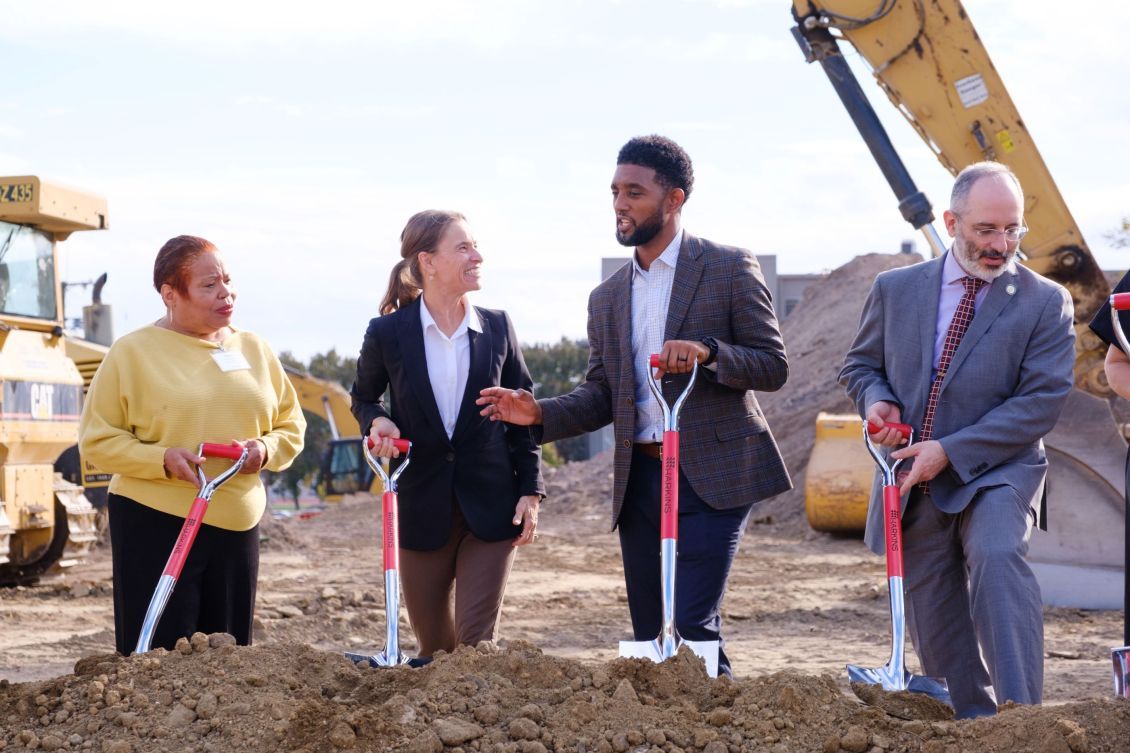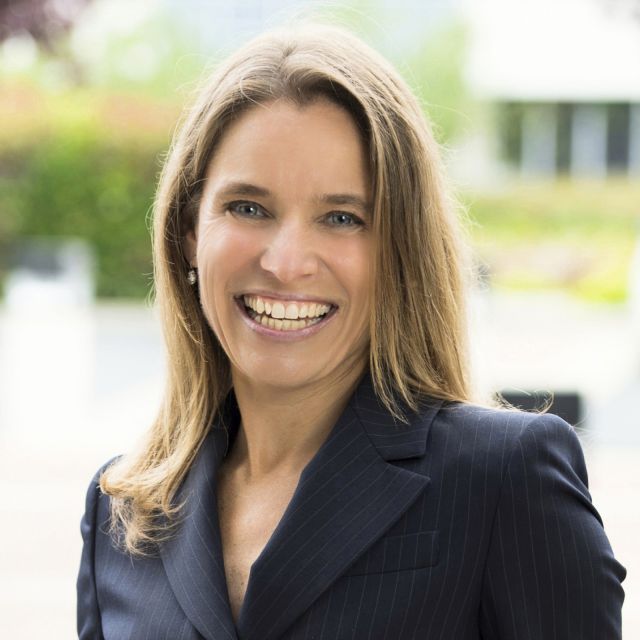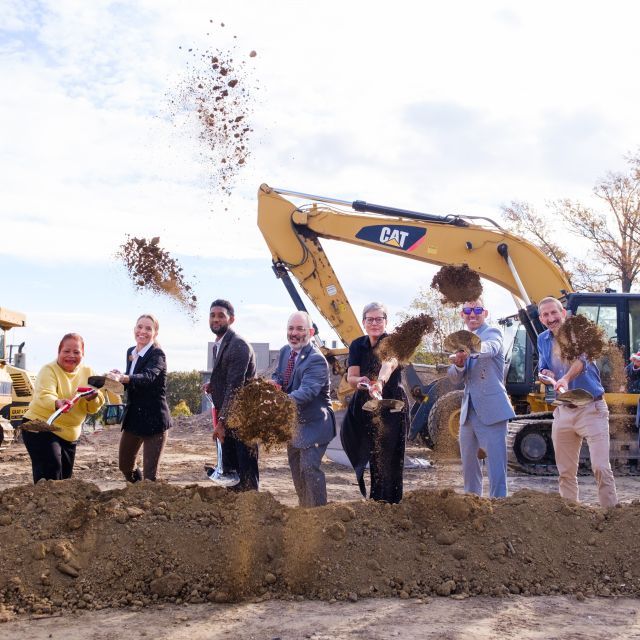When Janine Lind was four years old, her parents packed up the family and moved from their native Netherlands to Indonesia. What she observed in both countries — and in subsequent moves across continents — shaped her belief that a decent, safe place to live matters regardless of nationality or socioeconomic status.
“I truly believe that housing is a foundation for people to build their lives, that it’s a basic human right, and we need to do better to assure that everyone has an affordable place to live,” said Lind, who is in her eighth month as president of Enterprise Community Development.
As the leader of the largest nonprofit affordable housing developer in the Mid-Atlantic, Lind oversees Enterprise’s Community Development division’s residential development, preservation, asset and property management, and resident services – including a $1.4 billion portfolio of 116 communities serving 23,000 residents.
In between ground breakings and grand openings, we recently caught up with Lind to talk about her background, Community Development’s strengths and challenges, and her vision for solving the region’s affordable housing shortage.
How did you get into affordable housing?
Years ago, my husband and I were living in an apartment community in Los Angeles, when the manager — who was leaving — asked me, ‘Why don’t you apply for my job? You’re good with people.’ I was 24 and had been teaching aerobics as I looked for a job. I fell into affordable housing. I chose to stay in this field because I quickly saw the impact that I could have on people’s lives.
When I look back at my own life, my desire to help people was sparked and then formed by my family’s travels when I was young. My father was a wanderer and when he was told he could not fly in the Dutch Air Force due to his poor eyesight, he went back to school to become an insurance broker and eventually landed a job with a firm that moved us to Jakarta. I was exposed to different socioeconomic communities and saw the importance of home in vastly different environments. My best friends were kids who were living in tents on big open spaces. Later, when I was a teen, we moved to Hong Kong, which is more modern and more international but certainly very much a melting pot of different backgrounds.
In my original home — the Netherlands — we had a core belief that no one sleeps on the street at night. People come together to make sure everyone has a bed at night indoors. That’s really become central to my own belief system. And having been in America for well over 30 years, it is just sad and frustrating that as advanced and rich as a country that we are, we can't address this problem, and that it has gotten worse over recent decades.
What drew you to Enterprise?
I was drawn to Enterprise because I’m committed to creating homes but also building opportunity. I’m focused on creating communities, advocating for policy and solutions, while also test-driving new approaches. I’m so excited to have this opportunity to be part of this ecosystem at Enterprise where I can influence systems change, not just at the local level, but at the national level.
What are you most excited about in your new role?
I believe that strong organizations, whether nonprofit or a for-profit, thrive if they have three things: strong people, a strong mission, and a strong and healthy balance sheet. We do have some work to do to strengthen our balance sheet [at Community Development], but overall, as an organization, we certainly have all three of those legs of the stool.
We also have exceptional people who are committed with hearts and minds to our mission. And that really goes back to Jim Rouse and the founding of Enterprise.
I'm so excited about the opportunity here. We have an amazing team that is dedicated, talented, and that wants to expand our impact and create places where our residents thrive.
What do you see so far as your organization’s greatest strengths and the biggest opportunities?
Our greatest strength is perseverance. When I look at the growth of Enterprise Community Development, it's incredible that in a matter of two years, we tripled in size with the acquisition of the Shelter Group and then the addition of the CPDC portfolio. Then Covid happened. This team of people just persevered and continued to do the work and lean into our mission.
We now have the opportunity to nurture and support the team with all the right resources so they can achieve their individual goals. And there’s a lot we can do for our residents. We do have some great resident services programs — including career programs, solar installation and The Thome Aging Well program — but we can be intentional about our programs to zero in on what we think we're good at and where we can make a difference. We just closed out a needs assessment and resident survey across all our properties. The results will help us design our programs and services, whether we operate them ourselves or with partners.
Have there been any surprises so far in your first months?
I’ve known about Enterprise throughout my career. After being on the West Coast for 10 years and coming back to the Mid-Atlantic, I do notice some surprising differences. We’re not as progressive on the East Coast when it comes to funding and finding creative ways to fund affordable housing. I think we need to be more progressive here.
When I told colleagues and peers that I was joining Enterprise to run Enterprise Community Development, they looked surprised that we own apartments. It’s not a small portfolio with 13,000 units! It’s a reminder of how big this country is.
What is your vision for Enterprise Community Development for the short term and longer term?
In July, our leadership team came together to develop a theory of change for what this organization can become. If people have what they need to prosper, they can contribute to their communities as well. We’re here to provide them that support. The housing we create doesn't just benefit the residents —it benefits communities.
Recently, we had a great example in Richmond, Virginia. We celebrated the groundbreaking of Highland Terrace Apartments, which provides 66 homes that are sustainable and affordable. At the same time, we broke ground on a new community, Green Park Apartments, that will bring 43 affordable apartments to the Highland Park neighborhood. Our vision here and everywhere is to provide homes that are near jobs and transit, and to make sure our residents have access to the resources they need. We also aim to continue to lead by embedding clean energy into our developments and to build upon our environmentally sustainable portfolio.
As a society, we continue to grapple with a shortage of affordable housing. It’s a bipartisan issue and everyone is talking about it. The crisis stems back to the unfair housing systems and policies that have been around for decades. Our team believes that if we don't do something about that, then the socioeconomic gaps will widen, and the next generation is going to continue to suffer from poverty.
We want to be a part of solving that and making our world better. For now, that means going deep in the Mid-Atlantic region and working with who we call our fellow travelers, influential allies in education, workforce development and elsewhere. It also means being a part of shaping public opinion and working with policymakers.
We’re developing a plan that will focus on three pillars: our people, our places, and our voice. In five years, we’d like to deliver on this vision and be a part of solving the shortage and providing upward mobility, addressing racial equity, and creating opportunities for our residents and our employees as well.


